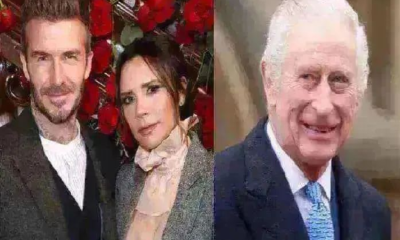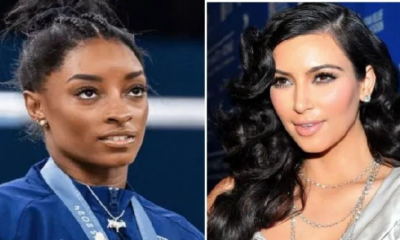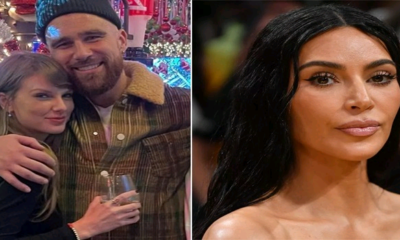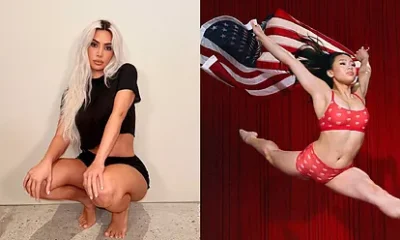NEWS
Kim Kardashian slammed for ‘tacky’ move as fans say she ‘missed the mark on elegance’
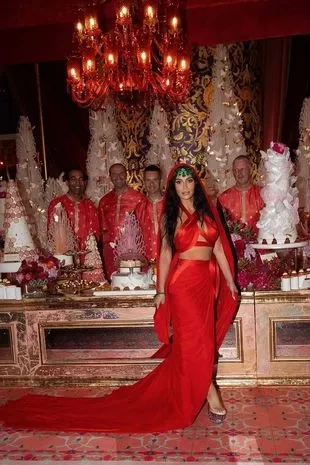
Kim Kardashian has been called out for her look ( Image: Instagram/kimkardashian)
Kim Kardashian, a prominent figure in reality television and business, is no stranger to controversy. This past weekend, her appearance at the lavish wedding of Anant Ambani and Radhika Merchant in Mumbai has stirred significant online discourse, with fans criticizing her for what many perceive as a “tacky” move that missed the mark on elegance.
According to a report by The Mirror on Tuesday July 16,2024, Anant Ambani, the youngest son of India’s wealthiest family, and Radhika Merchant, a well-known personality in the Indian business community, celebrated their nuptials with grandeur. The event was a star-studded affair, attracting celebrities from around the world. Kim Kardashian, always a focal point of media attention, shared numerous photos and videos from the ceremony on her social media platforms, showcasing her experiences and interactions during the festivities.
However, what was intended to be a glimpse into the opulence and joy of the event quickly turned into a point of contention. Fans and followers of Kardashian flooded social media with critical comments, arguing that her posts were out of touch with the cultural and social nuances of the occasion. The primary criticism revolved around her choice of attire and the manner in which she presented herself at the wedding.
Khloe Kardashian joined her sister at the wedding ( Image: kimkardashian/Instagram)
Kardashian opted for a glamorous outfit that, while undoubtedly stylish, was deemed by many to be inappropriate for the cultural setting. Traditional Indian weddings, especially those involving prominent families, are steeped in customs and sartorial expectations. Attendees usually wear outfits that reflect these traditions, often incorporating elements of Indian fashion. In contrast, Kardashian’s attire was perceived as too Western and overly extravagant, failing to harmonize with the cultural milieu of the event.
Beyond her outfit, Kardashian’s behavior at the wedding also drew ire. Critics accused her of being overly focused on self-promotion, citing her incessant social media activity during the ceremony. Posting selfies and detailed updates from a private and culturally significant event was seen as disrespectful by many, detracting from the solemnity and significance of the rituals being performed.
Moreover, fans felt that Kardashian’s posts lacked the sensitivity and appreciation for the cultural richness of the occasion. Instead of highlighting the couple, their love story, or the beauty of Indian wedding traditions, her content was largely centered on herself. This self-centric approach was perceived as a missed opportunity to engage with and honor the cultural heritage she was witnessing. It also reinforced the notion of cultural insensitivity often associated with Western celebrities attending high-profile events in different parts of the world.
Critics weren’t a fan of her headband ( Image: kimkardashian/Instagram)
The backlash against Kardashian’s posts underscores a broader conversation about cultural appropriation and sensitivity. In an increasingly globalized world, the lines between cultural exchange and appropriation can be thin. Celebrities, with their vast influence, bear a particular responsibility to navigate these lines thoughtfully. Kardashian’s critics argue that her actions at the Ambani-Merchant wedding exemplified a lack of this thoughtful navigation, highlighting a persistent issue of cultural insensitivity among Western stars.
This incident is not the first time Kardashian has faced such criticism. Her ventures into beauty and fashion have frequently sparked debates about cultural appropriation, with accusations of borrowing elements from different cultures without proper acknowledgment or respect. The wedding incident, thus, adds to a pattern of behavior that many find problematic.
On the other hand, there are those who defend Kardashian, arguing that the criticism is overly harsh. They point out that as a global celebrity, her presence at the wedding brought international attention to the event, which could be seen as a positive. Additionally, supporters argue that her fashion choices and social media posts are in line with her brand, and expecting her to conform entirely to different cultural norms might be unrealistic.
Nonetheless, the overwhelming sentiment remains one of disappointment. The elegance and grace associated with traditional Indian weddings, and particularly with the Ambani family’s high-profile celebrations, seemed to be overshadowed by Kardashian’s perceived faux pas. For many, her presence did not enhance the event but rather detracted from its cultural and social significance.
In conclusion, Kim Kardashian’s appearance at the Ambani-Merchant wedding has ignited a debate about cultural sensitivity, the responsibilities of global celebrities, and the fine line between celebration and appropriation. While her defenders might see her actions as benign or even beneficial, the predominant view is that she missed a crucial opportunity to engage respectfully and elegantly with a rich cultural tradition. This incident serves as a reminder of the ongoing need for celebrities to approach diverse cultural contexts with greater awareness and sensitivity.

